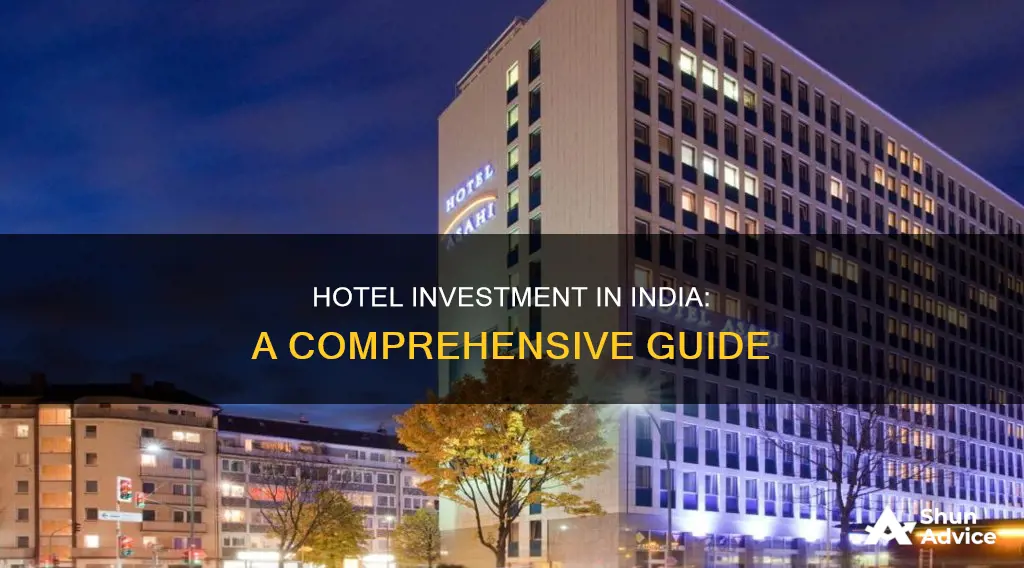
The hotel industry in India is a significant contributor to the country's economy, and investing in hotels can be a lucrative opportunity. The industry is expected to grow, driven by rising disposable income and travel demand. Before investing, it is essential to understand the different investment options, such as full ownership, crowdfunded investments, real estate investment trusts (REITs), and hotel stocks. Conducting thorough research, assessing the market value, financial planning, and implementing risk mitigation strategies are vital to making informed investment decisions in the hotel industry.
| Characteristics | Values |
|---|---|
| Hotel industry growth drivers | Disposable income, travel, business travel and events, religious and cultural tourism, the wedding industry, foreign direct investment |
| Hotel industry challenges | Economic downturns, natural disasters, pandemics, competition, regulatory risks |
| Hotel industry trends | Demand for heritage and boutique hotels, online booking systems, digital payments, workcations, staycations |
| Investment types | Full ownership, crowdfunded hotel investments, real estate investment trusts (REITs), hotel stocks |
| Investment tips | Research the hotel industry, identify hotel companies, analyse financial performance, open a Demat account, monitor your investment, review and adjust your portfolio |
| Investment considerations | Location, service quality, current industry trends, financial performance, brand strength, tourism growth potential, valuation of hotel stocks |
| Investment risks | Economic trends, global and local market trends, company performance and financials, government regulations |
| Investment benefits | Diversification, income generation, potential for long-term growth, global exposure |
What You'll Learn
- Research the hotel industry, including growth drivers and challenges
- Identify hotel companies that align with your investment strategy
- Analyse financial performance, including revenue growth and profitability
- Open a Demat account with a reputable broker
- Monitor your investment and keep track of hotel stock prices

Research the hotel industry, including growth drivers and challenges
Researching the hotel industry in India reveals a sector that is developing and growing fast. It has a significant positive impact on the country's economy and tourism levels. The industry is expected to grow at a compound annual growth rate (CAGR) of 4.73% from 2024 to 2029, reaching approximately US$31.01 billion by 2029, up from US$24.61 billion in 2024. This growth is driven by a mix of economic, social, and technological factors.
Growth Drivers
The hotel industry in India has several factors contributing to its growth:
- Business Travel and Events: India is a hub for business meetings and events, generating steady demand for premium hotel accommodations. The resurgence of corporate events and MICE (Meetings, Incentives, Conferences, and Exhibitions) post-pandemic has accelerated the industry's recovery.
- Religious and Cultural Tourism: India's diverse culture, heritage, and natural landscape attract millions of domestic and foreign tourists to its sacred sites each year. Government initiatives such as the Swadesh Darshan and PRASAD schemes further support this segment.
- The Wedding Industry: India's wedding industry, valued at trillions of rupees, has created significant demand for luxury hotels, especially in cities known for destination weddings.
- Foreign Direct Investment (FDI): The hospitality sector has attracted substantial FDI, with US$17.1 billion invested since 2000. This has fuelled the expansion of international hotel chains.
- Domestic Leisure Travel: The surge in domestic leisure trips has boosted occupancy rates and room prices, particularly in urban hubs like Delhi, Mumbai, and Bangalore.
- Infrastructure Development: Improved air connectivity and infrastructure development in tier-II and tier-III cities offer significant growth opportunities.
- Rising Disposable Income: Increasing disposable incomes fuel higher spending on leisure and hospitality services.
- Government Support: The Government of India has allowed 100% FDI in the hotel and tourism sector, encouraging investment.
Challenges
Despite the positive outlook, the hotel industry in India also faces several challenges:
- Economic Cycles: The hotel industry is sensitive to economic downturns, which can lead to reduced travel and lower profitability.
- Competition: The industry is highly competitive, with many players vying for market share. This competition can result in price wars and thin profit margins.
- Skilled Workforce Shortage: There is a shortage of skilled employees, especially in interior regions, and a high turnover of quality workers.
- Safety Concerns: International tourists have safety concerns, and the country's image is affected by poverty, political instability, and women's safety issues.
- High Guest Expectations: Ever-changing consumer demands and competition compel hospitality players to reconcile short-term investments with long-term business objectives.
- Infrastructure Bottlenecks: Infrastructure facilities need upgrading, and there is a lack of integration between domestic and international tourism.
- High Costs: The high cost of land and other operational costs, such as utilities and taxes, can discourage investment in new hotel construction.
- Stagnant Innovation: The industry needs to innovate to break out of commoditisation and meet evolving guest expectations.
- Technological Challenges: Hotels face challenges in choosing the right software, employee techno-phobia, maintaining guest privacy, and dealing with technological obsolescence.
Tilt Your Investment Portfolio: Value and Small-Cap Focus
You may want to see also

Identify hotel companies that align with your investment strategy
When identifying hotel companies that align with your investment strategy, it is important to conduct thorough research and consider various factors. Here are some guidelines to help you in this process:
- Analysing Company Performance and Financial Health: Evaluate the financial health and performance of hotel companies by examining revenue, profit margins, debt, liquidity, and past stock performance. This information will enable you to make informed decisions and understand the company's ability to generate returns.
- Assessing Brand Strength: Consider investing in companies with strong brand recognition and a loyal customer base. A robust brand can lead to higher pricing power and improved financial performance.
- Understanding Market Trends: Stay updated with the latest trends in the hospitality industry, such as shifts in consumer preferences, tourism patterns, and regulatory changes. This knowledge will help you anticipate potential impacts on the performance of hotel stocks.
- Evaluating Risk Factors: Be mindful of the risks associated with investing in the hospitality industry, such as economic downturns, natural disasters, competition, and regulatory compliance. Carefully consider your risk tolerance and investment goals before making any decisions.
- Utilising Tools and Platforms: Take advantage of tools like the Tickertape Stock Screener to filter and identify hotel companies based on specific performance metrics, financial criteria, and sector-specific factors. This can streamline your search for hotel companies that align with your investment strategy.
- Seeking Expert Advice: Consult a financial advisor or expert who can provide valuable insights and guidance in selecting hotel stocks that match your investment objectives, risk profile, and financial goals.
- Lemon Tree Hotels: Known for its youthful vibe, Lemon Tree Hotels operates in the upscale and mid-market sectors. They have a wide presence across India, including metro regions and tier I and II cities.
- Chalet Hotels Limited: Part of the K Raheja Corp group, Chalet Hotels owns and operates upscale hotels in major metro cities such as Mumbai, Delhi, Hyderabad, Bengaluru, and Pune. They also have commercial spaces near their hospitality assets.
- Indian Hotels Company Limited: This company owns and manages premium and luxury hotel brands, along with F&B, wellness, salon, and lifestyle brands. Their brands include Taj, SeleQtions, Vivanta, Ginger, and more.
- EIH Associated Hotels Limited: EIH operates five-star deluxe and five-star hotels under the brands The Oberoi and Trident across major cities and tourist destinations in India. They also offer services like management, marketing, laundry, and licensing of shops.
- Juniper Hotels: A leading hotel development and ownership company in India, Juniper Hotels has properties managed by Hyatt, a global hotel operator. They excel in identifying hospitality opportunities, developing high-end hotels, and efficiently managing their assets.
Remember to conduct your own research, assess your financial goals and risk tolerance, and consult a financial professional before making any investment decisions.
Open Architecture Investment Management: Unlocking Investment Opportunities
You may want to see also

Analyse financial performance, including revenue growth and profitability
When considering investing in the hotel industry in India, it is important to conduct a thorough financial analysis of the company. This involves evaluating the revenue growth, profitability, and overall financial health of the hotel business. Here are some key factors to consider:
Revenue Growth:
- Historical and Current Financial Data: Analyse the hotel's financial reports to assess revenue growth over time. Look at key metrics such as total revenue, revenue per available room (RevPAR), and average daily rate (ADR). Compare these metrics with those of competitors and industry averages to gauge the hotel's performance.
- Market Trends: Understand the local and regional hospitality market trends. Look at factors such as occupancy rates, average daily rates, and revenue per available room. Consider the demand drivers, including increased global travel, business expansion, and the rise of the middle class with disposable income.
- Location: Evaluate the hotel's location and its proximity to key attractions and business centres. Consider the impact of location on revenue growth potential.
Profitability:
- Profit Margins: Examine the hotel's profit margins by comparing revenue and expenses. Look at the gross profit margin, operating profit margin, and net profit margin. Assess how these margins compare to those of similar hotels and industry averages.
- Cost Structure: Analyse the hotel's cost structure, including fixed and variable costs. Identify areas where costs can be optimised without compromising the guest experience.
- Brand Strength: A strong and well-recognised brand can command higher pricing power and customer loyalty, leading to improved profitability. Assess the brand value and reputation of the hotel through customer reviews, brand recognition surveys, and market research.
- Operational Efficiency: Evaluate the management practices and operational efficiency of the hotel. Identify any areas of inefficiency or waste that may impact profitability. Consider the use of technology and streamlined processes to optimise operations.
- Financial Ratios: Calculate and analyse key financial ratios specific to the hospitality industry, such as the gross operating profit per available room (GOPPAR), which takes into account the hotel's revenue and occupancy rates. Compare these ratios with industry benchmarks to assess the hotel's financial performance.
By carefully analysing these aspects of revenue growth and profitability, investors can make more informed decisions about investing in hotels in India, minimising risks, and maximising potential returns. It is also essential to stay updated with industry trends, government regulations, and economic conditions that may impact the financial performance of the hotel industry.
Investing Cash in India: A Guide to Getting Started
You may want to see also

Open a Demat account with a reputable broker
To start investing in hotel stocks in India, you'll need to open a Demat account with a broker. A Demat account is an electronic account that allows you to hold and manage your investments in stocks, bonds, mutual funds, and other financial securities in a digital format.
Choose a Reputable Broker:
When selecting a broker, look for one that is well-established, trustworthy, and has a good reputation in the industry. The broker should be registered with the Securities and Exchange Board of India (SEBI) and offer a range of investment options, including hotel stocks. Look for a broker that provides good customer service, an easy-to-use platform, and competitive brokerage fees.
Account Opening Process:
Opening a Demat account is a straightforward process. Most brokers allow you to open an account online by submitting the required documents and completing the account opening form. Some brokers may also offer assistance with the account opening process, including in-person support. Ensure you understand the account opening charges and annual maintenance fees associated with the Demat account.
Documents Required:
To open a Demat account, you will typically need to provide proof of identity and proof of address. Accepted documents for identity proof include a PAN card, Aadhaar card, passport, voter ID card, or driving license. For address proof, you can use a ration card, passport, voter ID card, driving license, bank passbook, or utility bill. Additionally, you may need to provide proof of your bank account, such as a canceled cheque or account statement.
Linking Your Bank Account:
It is essential to link your bank account to your Demat account to facilitate seamless fund transfers and settlements when buying and selling shares. Ensure that your bank account is active and in your name. Some brokers may also require income proof, especially if you plan to trade derivatives or invest in specific segments.
Understanding Charges and Fees:
When opening a Demat account, be mindful of the various charges and fees associated with the account. These may include account opening charges, annual maintenance charges, brokerage fees, and transaction charges. Compare the fee structures of different brokers to find the most cost-effective option for your investment needs.
Features and Tools:
Look for a broker that offers a range of features and tools to enhance your investment experience. This may include advanced charts and analysis tools, a user-friendly trading platform, and access to research reports and market insights. Some brokers also provide educational resources and learning platforms to help you make informed investment decisions.
Customer Support:
Opt for a broker that offers reliable and responsive customer support. This is crucial if you are new to investing or encounter any issues with your account. Consider the availability of phone, email, and chat support, as well as the broker's track record in resolving customer queries promptly and effectively.
Security and Compliance:
Ensure that the broker you choose prioritizes the security of your personal and financial information. Look for brokers that follow regulatory guidelines and implement encryption and other security measures to protect your data. Additionally, consider the broker's compliance with SEBI regulations and their track record in maintaining the safety of their clients' investments.
Additional Services:
Some brokers offer value-added services that can benefit investors. These may include investment advisory services, portfolio management tools, tax-saving recommendations, and access to initial public offerings (IPOs). Consider your specific needs and assess how these additional services can support your investment journey.
Ease of Use and Accessibility:
Choose a broker with a user-friendly interface that makes navigating the platform and executing trades straightforward. Consider the availability of a mobile app and the ability to access your account and place trades on the go. Ensure that the broker's platform is stable and can handle high trading volumes without frequent crashes or technical issues.
By following these steps and selecting a reputable broker, you can confidently open a Demat account and start investing in hotel stocks in India. Remember to conduct thorough research, understand the risks involved, and seek professional advice when needed to make informed investment decisions.
Young Savers: Investing for the Future Now
You may want to see also

Monitor your investment and keep track of hotel stock prices
Monitoring your investment in hotel stocks is crucial to staying informed and making strategic decisions. Here are some detailed instructions on how to monitor your investment and keep track of hotel stock prices in India:
- Regularly Review Stock Prices: Keep a close eye on the stock prices of the hotel companies you have invested in. Utilize reliable sources and platforms to track the performance of these stocks over time. Set up price alerts to notify you of significant changes.
- Stay Informed About Company News: Be vigilant about following news and updates related to the hotel companies in your portfolio. This includes keeping track of their financial reports, press releases, and any other relevant information. Subscribe to their newsletters, follow them on social media, and set up Google Alerts for timely updates.
- Analyze Financial Metrics: Go beyond stock prices and delve into the financial metrics of the companies. Assess revenue growth, profitability ratios, and other key performance indicators. Compare these metrics with those of their competitors and industry averages.
- Track Industry Trends: Stay abreast of the latest trends and developments in India's hotel industry. Monitor occupancy rates, average daily rates (ADR), revenue per available room (RevPAR), and other key industry metrics. Understand the factors driving these trends, such as tourism patterns, government initiatives, and consumer behaviour.
- Utilize Online Tools: Take advantage of online tools and platforms specifically designed for investment tracking. These tools can provide you with real-time data, charts, and analysis to help you make informed decisions. For example, you can use Tickertape's platform to examine financial ratios and key performance indicators.
- Review Your Portfolio Periodically: Set aside time at regular intervals to review your overall investment portfolio. Evaluate the performance of your hotel stocks in the context of your broader investment strategy. Consider factors such as market trends, economic conditions, and the companies' financial health.
- Adjust Your Holdings as Needed: Based on your monitoring and analysis, make necessary adjustments to your portfolio. If a particular hotel stock is consistently underperforming or no longer aligns with your investment goals, consider reallocating your funds to other opportunities. Conversely, if a stock is performing well and shows potential for further growth, you may decide to increase your investment.
- Seek Expert Advice: Consult financial advisors or experts in the Indian hotel industry for insights and guidance. They can provide you with valuable information and help you interpret the data you are tracking. Consider their recommendations, especially if you are unsure about a particular investment decision.
- Diversify Your Hotel Stock Investments: Diversification is a crucial aspect of investment monitoring. Ensure that you have a well-diversified portfolio of hotel stocks, investing across different segments, such as luxury, mid-range, and budget hotels. Diversification can help mitigate risks and maximize your potential for long-term gains.
- Set Performance Benchmarks: Establish clear benchmarks and performance metrics for your hotel stock investments. Compare the actual performance against these benchmarks to identify areas of success or concern. This will help you make more informed decisions about buying, holding, or selling specific hotel stocks.
- Stay Aware of Global Events: Keep yourself informed about global events and trends that could impact the hotel industry. For example, travel restrictions, economic shifts, or natural disasters can affect hotel stock prices. Stay tuned to reputable news sources to anticipate and respond to such events promptly.
By diligently following these steps, you will be able to effectively monitor your investment in hotel stocks and make more informed decisions. Remember that investing in the hotel industry comes with certain risks, so always conduct thorough research and consider seeking professional advice before making any investment decisions.
Air India: An Investment Guide for Beginners
You may want to see also
Frequently asked questions
You can invest in hotels in India by buying hotel stocks, investing in hotel real estate investment trusts (REITs), or through full ownership of a hotel.
Hotels offer investors a steady income stream and long-term wealth-building potential. Investing in hotels can provide exposure to the hospitality industry, which is expected to grow, and can be a good way to diversify your investment portfolio.
The hotel industry is sensitive to economic downturns, global events, and competition from other hotels and online travel agencies. These factors can impact room occupancy rates and profitability.
When choosing a hotel to invest in, consider the location, brand strength and reputation, financial health, and market trends. Conduct thorough research and analysis to make an informed decision.







